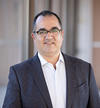Bariatrics
The Center for Weight Control at Nashoba Valley Medical Center offers both surgical and non-surgical options and support services to help patients lead healthier lives and achieve weight loss goals.
The Center for Weight Control at Nashoba Valley Medical Center offers both surgical and non-surgical options and support services to help patients lead healthier lives and achieve weight loss goals.
200 Groton Road
Ayer, MA 01432
978-784-9313

Our surgeons and dietitians work closely with our patients, providing education on weight loss methods and helping each individual decide which options are best. Compassionate, personalized care includes regular monitoring to ensure that weight is lost in a healthy and sustainable way.
We understand that being overweight is a medical condition that poses serious health risks, such as heart disease and diabetes, and also impacts your ability to live an active and healthy lifestyle. For people who have struggled with their weight and have been unable to maintain long-term weight loss, bariatric surgery may be the most effective means to lose weight and keep it off.
If your body mass index (BMI) is less than 40 you may benefit from non-surgical weight loss. Use this BMI calculator to see if our medical weight loss program is right for you.



